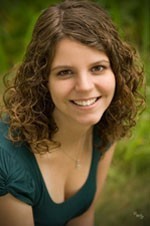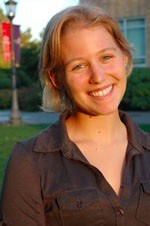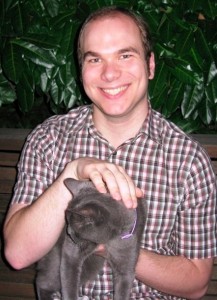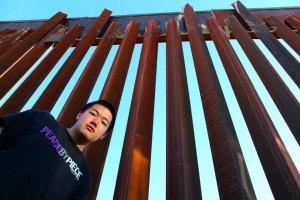by Ana Fonseca
Founders’ Day is known by many on campus as that day when you can catch up on schoolwork, or else get some extra shut-eye. But it really offers a rare opportunity to learn more about what our English major seniors actually do when they work on those semester-long capstones. (Not to mention giving the rest of us a sense of what we have to look forward to!)
This year’s Founders’ Day is next Tuesday, April 8. The English department is hosting three panels this year. Here’s the schedule –you should try to make at least one!
To whet your interest, here is a preview of what some of the seniors will be sharing in their presentations. Read on, and join next Tuesday, to see what they’ve been thinking, learning, writing, and crying (?) about.
Q: What will you speaking about on Founders’ Day? What is the subject of your senior capstone, and why did you choose it?
Kate Peifer: I will be presenting a few poems from my senior thesis. The subject of my capstone is creative writing (poetry) and I chose to research and write about this specific option because I feel I have accrued life experience during my four years at UP and wished to compile those into an art form I enjoy.
 Leah Becker: On Founders’ Day I will be speaking about the Human Genome Project’s effect on Speculative fiction, focusing on the change in Speculative Fiction that occurred in the 1980s. Basically, I’m talking about how science affects futuristic novels!
Leah Becker: On Founders’ Day I will be speaking about the Human Genome Project’s effect on Speculative fiction, focusing on the change in Speculative Fiction that occurred in the 1980s. Basically, I’m talking about how science affects futuristic novels!
Hannah Robinson: My paper looks at themes of motherhood in Aldous Huxley’s Brave New World and Margaret Atwood’s The Handmaid’s Tale. I’ve always had a soft spot for dystopian literature because of its invitation to examine how we – as a society – interact with, represent, and imagine our own culture. My investigation here looked at how motherhood is constructed as a societal institution, what function it has for these fictional societies, and what that function suggests about our own modern conceptions of motherhood.
 Cerice Keller: My capstone explores how African Americans view racial uplift in the early-mid 20th century through literature. Racial uplift is the concept from the late 19th century that considers how black Americans can improve their social and economic status. Ralph Ellison suggests in his novel Invisible Man that racial uplift is a matter of logic and reason, which frustratingly alienates men from themselves and creates a seemingly unbridgeable gender divide. I find that Toni Morrison through her novel Beloved acknowledges his dilemma and scoffs at it. She makes her characters subject to the same dehumanizing stereotypes to show that, in contrast, emotions are crucial to remembering the people for whom they work to uplift the race.
Cerice Keller: My capstone explores how African Americans view racial uplift in the early-mid 20th century through literature. Racial uplift is the concept from the late 19th century that considers how black Americans can improve their social and economic status. Ralph Ellison suggests in his novel Invisible Man that racial uplift is a matter of logic and reason, which frustratingly alienates men from themselves and creates a seemingly unbridgeable gender divide. I find that Toni Morrison through her novel Beloved acknowledges his dilemma and scoffs at it. She makes her characters subject to the same dehumanizing stereotypes to show that, in contrast, emotions are crucial to remembering the people for whom they work to uplift the race.
Jeffrey Kuang: I am going to read a wee bit from a story I wrote that revolves around the Chinese approach to the afterlife (in English, the Qingming festival). I wrote Chinese American short story fiction, where I tried to conjure elements of Homi K. Bhabha’s Unhomeliness, or basically trying/failing to balance two cultures and worlds into one individual. I chose the creative path because not many people do it (but should) and argument papers make me go ballistic.

Alex Jones: My capstone was prompted by intelligent design theorist Phillip E. Johnson’s assertion that Darwinist evolution is a “creation myth.” Leaving aside questions of evolution’s scientific accuracy, I took up this idea of evolution as myth to explore what Johnson calls its “spiritual and ethical implications,” eventually focusing in on a comparison with the Book of Job, a work which, like Darwin’s Origin of Species, leaves much unexplained.
Q: Why should students expect to learn thanks to your presentation? What is the “So What” that we should be looking for?
Kate Peifer: Other students should be aware of all of their options regarding a capstone/thesis and that taking a creative route is as beneficial and rewarding as taking a more methodical and usual route. The “So What” is every English major’s best friend and worst enemy. Sometimes, the “So What” is simple: because I can, because it’s fun and because writing is a process that shouldn’t always be methodized. Branch out of your literature comfort zone!
Leah Becker: Any student interested in apocalyptic and speculative fiction should head on over to my capstone presentation. Essentially, the change in speculative fiction that occurred in the 1980s shows how science has transitioned from being a political power to an individual power (particularly with the mapping of the human genome, allowing for human genetic manipulation), forcing readers to recognize that the fate of humanity might now lie in the hands of individual scientists, meaning less checks and balances, less government intervention, and less public knowledge. Come listen to this presentation if you want to know how to stop the end of the world!!!
 Hannah Robinson: Being fairly reductive, my “so what” is that motherhood can transcend individual women. Both texts are clear that despite antithetical presentations of the mother figure herself, the institution is deeply embedded in our society thanks to what it accomplishes for us.
Hannah Robinson: Being fairly reductive, my “so what” is that motherhood can transcend individual women. Both texts are clear that despite antithetical presentations of the mother figure herself, the institution is deeply embedded in our society thanks to what it accomplishes for us.
Cerice Keller: On perhaps the more basic level, I think this tension between racial uplift and emotion reveals that race relations can’t be evaluated from outward appearances alone. Statistics of education level and opportunity may be important, but how people feel about each other will determine on a subconscious (and conscious) level how they treat each other. But what I’ve thought about more from the African-American characters and writers is how, rather than reason, our ability to feel within ourselves and for one another makes us human.
Jeffrey Kuang: From a public relations perspective, many of us have various backgrounds/multi-ethnic identities whether we know about it, acknowledge it, or ignore it. I don’t really have an argument or like to argue, but in the words of Maya Angelou/Chinese Proverb/ Lou Holtz/etc: “A bird does not sing because it has an answer, it sings because it has a song.” Whether we like it or not, we all have a story to tell. From an honest perspective, I’m all for sleep and it’s gonna get hectic towards the end of the term so do whatever that floats your boat (this is my first time actually attending Founders’ Day), but you’d miss out on everyone’s great efforts.
Alex Jones: A student of the sciences could come to think about the role of the humanities in a science-dominated world, or a student of the humanities could come to consider the artistic and religious inspiration to be found in the sciences. For a more detailed “so what” statement, you’ll have to come see the presentation for yourself.
Q: What was your personal experience working on your capstone like? What’s something you learned or got out of it?
 Kate Peifer: My personal experience has been, frankly, an outlet and a stress-relief. I sit down, and write, or don’t write and just sit with a blank page and think, or don’t think and just sit. It really depends on the day. That’s a major difference between an argument paper and a creative writing thesis. Although there is still much reading and research, creative writing is up to you and often, making decisions on your own is not as easy as it appears. A lot depends on YOU, and if you don’t deliver, your entire thesis, even the idea or subject matter, resembles a piece of sh**.
Kate Peifer: My personal experience has been, frankly, an outlet and a stress-relief. I sit down, and write, or don’t write and just sit with a blank page and think, or don’t think and just sit. It really depends on the day. That’s a major difference between an argument paper and a creative writing thesis. Although there is still much reading and research, creative writing is up to you and often, making decisions on your own is not as easy as it appears. A lot depends on YOU, and if you don’t deliver, your entire thesis, even the idea or subject matter, resembles a piece of sh**.
Leah Becker: One thing I learned while writing my senior capstone paper was how the paper often falls into place all on its own, particularly when talking with your advisor. After doing hours and hours of research with seemingly no progress made on my paper, a simple conversation about my findings with Dr. Asarnow would help me realize that I actually HAD discovered an answer to my question, or a solution to a problem.
Hannah Robinson: I would be lying if I said that there weren’t some tears involved, but overall I found the challenge of writing my capstone to be a really rewarding process. I had to laugh at myself a few times for going back to my ENG 225 textbook, but I finally saw how everything we learn through our classes – research, close reading, integration of critical perspective – are relevant and helpful tools in the ‘real’ world of scholarly study.
What I got out of it? Well, every English major knows the inherent satisfaction of turning in a paper that you actually like and really believe in your argument. Looking at my thesis now, it’s like experiencing that feeling on steroids.
Cerice Keller: I’ve never run a marathon, but I feel like the thesis experience is how one would feel. It began with a determination to write a work of art (oh, high hopes!), it required constant perseverance of meticulous thought and writing revision, and although exhausted by the end, I felt a deep sense of accomplishment and satisfaction when I surrendered it to the print shop. Although I wrote on a specific academic topic, this perseverance taught me about myself: what I am capable of achieving, and perhaps more importantly, how I handle myself when I reach what seem to be my personal limitations. Writing the thesis is a humbling though addictive process in this way because, as it forced me to be patient with myself, it simultaneously kept enticing me to question what more?, to slowly pull myself out of frustration and exhaustion in order to keep discovering.
 Jeffrey Kuang: This past year I found out that some of my relatives have been detained/persecuted in both the U.S. and China, many I’ve never met so… yeah. After hearing that, I was lost in a forest. Scott Adams describes what I learned nicely: “Creativity is allowing yourself to make mistakes; art is knowing which ones to keep.”
Jeffrey Kuang: This past year I found out that some of my relatives have been detained/persecuted in both the U.S. and China, many I’ve never met so… yeah. After hearing that, I was lost in a forest. Scott Adams describes what I learned nicely: “Creativity is allowing yourself to make mistakes; art is knowing which ones to keep.”
Alex Jones: Having a lot of freedom was scary, but by drawing on the advice of my adviser and doing the work piece by piece, it was ultimately a lot of fun. I gained a lot of confidence by working with such a level of independence and going from feeling lost to having made something I’m proud of.
Q: What is one piece of advice you’d like to pass on to underclassmen for their senior capstones?
Kate Peifer: Write about what you love. Write smart, write clever, write true and write away, right away.
Leah Becker: Advice: do your research early. Writing the paper is the hardest part, but if you get the research out of the way as early as possible you will have more time to write, meaning less stress and less sleepless nights.
Hannah Robinson: Your advisor is a fantastic resource for you. There’s a reason that the English department takes so much care to match you with a thesis advisor in the field you want to investigate. Ask them questions and meet regularly! Their expertise is invaluably helpful.
Also, don’t pick your absolute most favorite-favorite-favorite book to study. Two reasons: 1) it’s hard to get beyond reader response if you’re so emotionally invested (not that you shouldn’t love your project, but some clinical distance is helpful) and, 2) You will read it more times than you ever wanted to and never be able to see it the same way again.
Cerice Keller: That last point: be patient with yourself. Choose a topic in which you are interested, and keep supporting yourself even when it seems that you’ve hit a roadblock in your writing, or that your main idea is lost in a fog of words on a document. Go to your advisor and rant, articulate your frustrations and ask for feedback, even cry if you want (it feels good). Just don’t allow yourself to be the person who says, “I don’t care anymore. I just want to get it over with.” You need to keep caring. This is your opportunity to be an expert on an awe-some! topic of your choosing and to have an experience of prolonged, intimate self-discovery. Instead of saying, “well, screw it,” pause it and go for a run, hang out with friends, have a drink and watch a movie—your project is not lost, remember that it kicks a#%, and allow yourself the mental recharge.
Jeffrey Kuang: In general, write and get into the habit of writing. I can give you a million quotes to “inspire you,” but here is something for those who want to go onto the creative path: “There is no greater agony than bearing an untold story inside you.” – Maya Angelou
Alex Jones: Start early – earlier than you think you’ll need to – so that you have plenty of time to explore ideas before pinning yourself down to anything. Even once you’ve decided, for the most part, what you’re going to do, allow your ideas and your project to shift or evolve. Let your interests guide your topic; the more fun you had writing it, the more fun it will be to read it.
